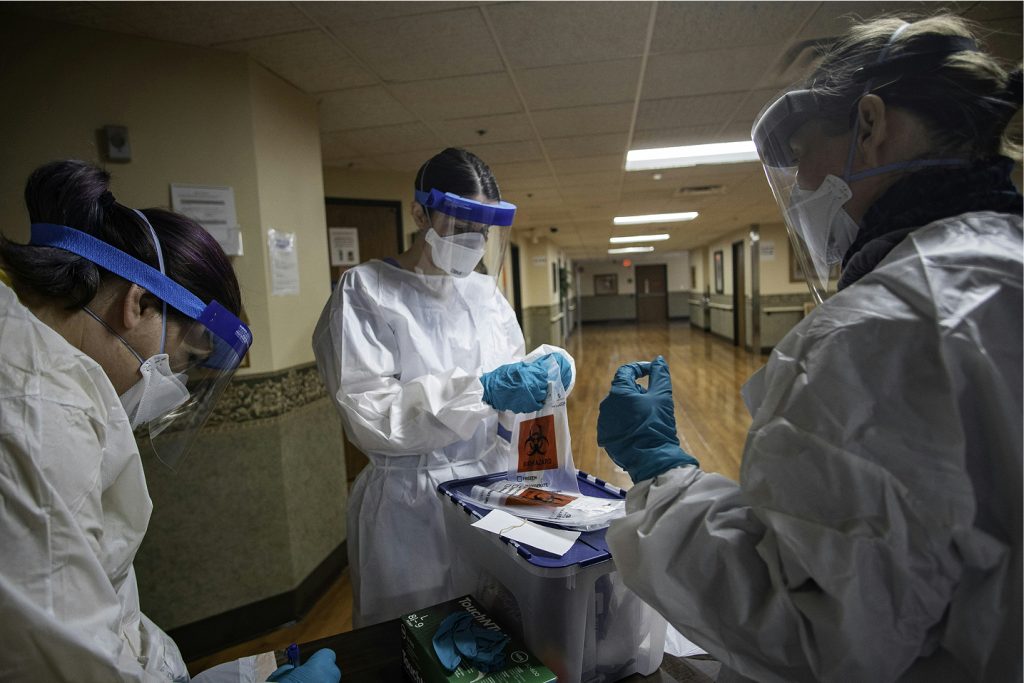
Section 5.2
Support Job Creation Across the United States for Americans at All Skill Levels
Chapter 05
Section 5.2
5.2A
Congress must maximize the impact of biomanufacturing workforce training programs.
5.2B
Congress should expand educational efforts in biotechnology for American students.
In the United States, education and training programs are not aligned with the skills that the biotechnology industry demands. As a result, American workers are not being adequately prepared for biotechnology careers.
To increase bioliteracy across the country, Americans of all ages will need to be excited about biology. The Commission learned about good ways to foster such enthusiasm, from community “LABraries” to curricula developers like BioBuilder to high schoolers’ participation in international competitions like International Genetically Engineered Machine (iGEM).284 There are more biotechnology education efforts that are not within the federal government’s purview but are valuable components of broader bioliteracy. State and local governments have additional authorities to strengthen biotechnology education from kindergarten through post-secondary programs. Private companies, non-profits, and community leaders should also play an active role in contributing to local biotechnology. In the coming months, the Commission will seek more opportunities to raise awareness of positive examples of bioliteracy in action to inspire local communities to pursue similar objectives.
At the same time, the Commission recognizes that the federal government has a specific role to play in supporting job creation—namely, standardizing credentials, aggregating national data, and driving future-focused education and training programs.
Recommendation
5.2A

Recommendation 5.2A
Congress must maximize the impact of biomanufacturing workforce training programs.
Exemplary federal workforce and training efforts include the InnovATEBIO National Biotechnology Education Center, the National Science Foundation’s (NSF) Experiential Learning for Emerging and Novel Technologies (ExLENT) program, Bioindustrial Manufacturing and Design Ecosystem’s (BioMADE) Scalable Comprehensive Workforce Readiness Initiatives, BioFabUSA’s Biofabrication Technician Registered Apprenticeship Program, and the National Institute for Innovation in Manufacturing Biopharmaceuticals’s (NIIMBL) eXperience program.285 The Department of Defense SkillBridge Program and BioMADE’s Warfighter-to-Scientist workshops train servicemembers for biotechnology careers.286
These federally funded programs and initiatives aim to reach high schools, vocational-technical schools, community colleges, four-year institutions, community workforce development centers, and even individual students. They prepare Americans for biotechnology and biomanufacturing careers, particularly entry-level technician positions. These programs expose students and workers to careers in biotechnology, provide training with industry-informed curricula, present hands-on learning opportunities, and offer credentials that validate skills to employers. They also engage veterans, who bring unique skills and experiences to the industry.287 Currently, these programs have limited capacity, infrastructure, and reach. With the right resources, they could have an even broader nationwide impact.
Congress must expand these and other federal biomanufacturing workforce training programs and enable more participation from more regions and states. Congress must also require that programs coordinate trainings to maximize their impact, as well as require that programs assess their efficacy and accreditation.
Congress should stipulate that federal biotechnology and biomanufacturing workforce training programs not only bring more workers into the industry but also help workers upskill and stay current with the latest advances.
Standardizing Biomanufacturing Skills and Accreditation
A major impediment to the biomanufacturing workforce is the lack of standardization of skills-based training. Skills-based training programs range from courses taught at vocational-technical schools to apprenticeships. Without standardizing the training and accreditation of these programs, however, employers may not know what specific skills a job applicant has gained from them. At the same time, biomanufacturing workers might have to repeat trainings to satisfy job requirements, wasting money and time.
Accreditation provides a standardized way to validate a worker’s knowledge, skills, and competencies, ensuring that they meet industry-recognized benchmarks. Although there are discrete skills assessment efforts in the biosciences industry, these mechanisms have not been widely adopted.288 The federal government has the authority to develop and promulgate benchmarks for workforce standardization, but there is no current effort to do so for biomanufacturing.
Congress should require the Department of Commerce (DOC), the Department of Labor (DOL), and other relevant agencies to develop and promote nationally recognized competency models for biomanufacturing training and education.
Such accreditation programs should focus on a wide variety of biotechnology training, spanning pharmaceuticals, agriculture, and research labs. For example, microcredentials for specific manufacturing disciplines, for common biotechnology techniques like growing cells in a laboratory, and for laboratory safety would be broadly useful across the industry—and therefore valuable for workers and prospective employers.
Recommendation
5.2B

Recommendation 5.2B
Congress should expand educational efforts in biotechnology for American students.
Not all states make biology a high school graduation requirement. Less than 30 percent of public high school biology classes include molecular biology, a foundational precursor to biotechnology.289 High school is often the final opportunity most Americans have to receive a STEM education, including the chance to take biology and biotechnology classes. Given how many Americans enter the workforce immediately after high school, this juncture is a critical moment to motivate interest in biotechnology careers and provide quality education to enable success in biotechnology jobs.
Previous federal efforts, such as the National Defense Education Act (NDEA) of 1958, helped lay the foundation for science education in the United States.290 To meet the rising demand for skilled professionals, especially in critical and emerging technologies, leading experts have called for a NDEA 2.0 to invest in modernized STEM education.291 For example, the Next Generation Science Standards (NGSS) is a state-level initiative developed with input from federal agencies that provides voluntary standards for states to improve STEM education. To date, however, only 20 states and the District of Columbia have adopted these benchmarks.292 Limited resources—including to support teachers—and insufficient classroom time have slowed the uptake of these standards.293
While the federal government’s role in directly affecting education policies and curricula is limited, there are specific federal authorities to support and encourage state-level education in biotechnology—including workforce training and technical education—by providing resources, funding, and guidance to help states strengthen their educational programs and align them with national priorities.
The federal government can help enable a comprehensive ecosystem to support student success from high school to career. Congress should expand biotechnology education through:
- a new National Science Foundation (NSF) grant program to support student-to-career pathways in biotechnology that ensure a seamless transfer of relevant credentials (such as certificates, degrees, and apprenticeships) among educational institutions for students to obtain all levels of biotechnology jobs;
- a Biotechnology Scholarship for Service program to incentivize undergraduate and graduate students to pursue biotechnology-related fields of study with conditional guarantee of government employment; and
- a Biotechnology for All High School Students initiative comprising a grant program and establishing a consortium to advance nationwide secondary education (grades 9-12) through the NSF and the Department of Education.
(For additional details on supporting student-to-career pathways, a Biotechnology Scholarship for Service program, and a Biotechnology for All High School Students initiative, see Appendix F.)